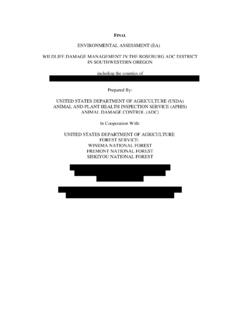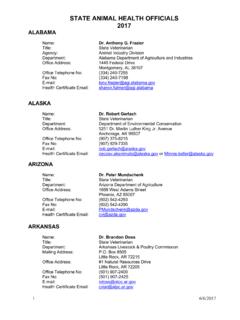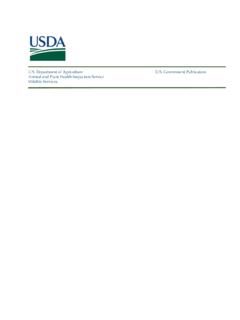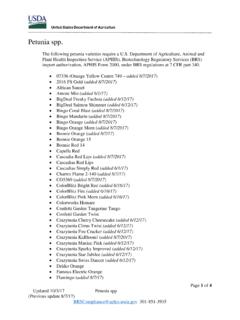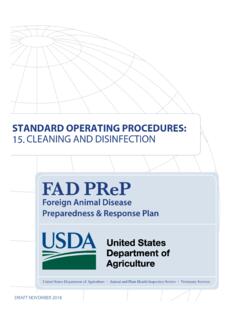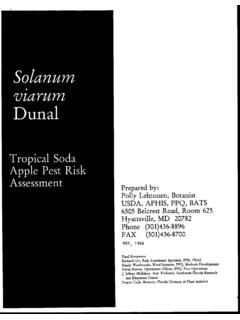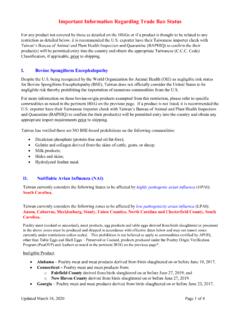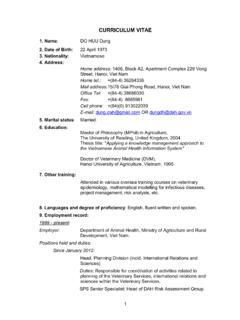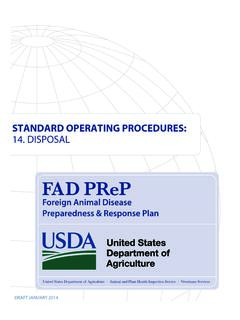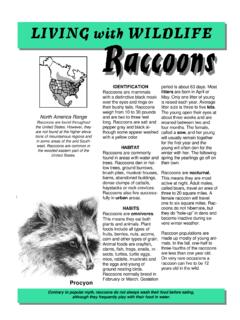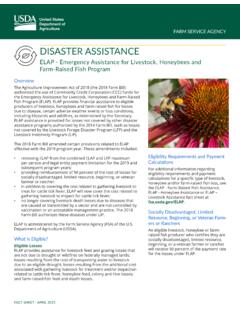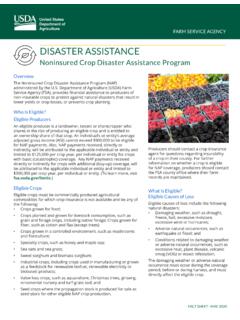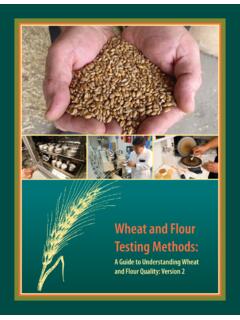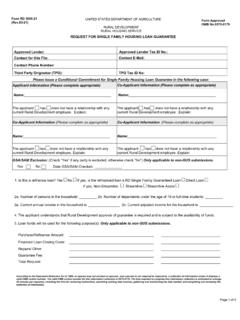Transcription of Licensing and Registration Under the Animal Welfare Act
1 united states department of agriculture Licensing and Registration Under the Animal Welfare Act Guidelines for Dealers, Exhibitors, Transporters, and Researchers Animal and Plant Health Inspection Service Program Aid No. 1117. In accordance with Federal civil rights law and department of agriculture ( usda ) civil rights regulations and policies, the usda , its Agencies, offices, and employees, and institutions participating in or administering usda programs are prohibited from discriminating based on race, color, national origin, religion, sex, gender identity (including gender expression), sexual orientation, disability, age, marital status, family/parental status, income derived from a public assistance program, political beliefs, or reprisal or retaliation for prior civil rights activity, in any program or activity conducted or funded by usda (not all bases apply to all programs). Remedies and complaint filing deadlines vary by program or incident.
2 Persons with disabilities who require alternative means of communication for program information ( , Braille, large print, audiotape, American Sign Language, etc.) should contact the responsible Agency or usda 's TARGET Center at (202). 720-2600 (voice and TTY) or contact usda through the Federal Relay Service at (800) 877-8339. Additionally, program information may be made available in languages other than English. To file a program discrimination complaint, complete the usda . Program Discrimination Complaint Form, AD-3027, found online at How to File a Program Discrimination Complaint ( usda -customer) and at any usda office or write a letter addressed to usda and provide in the letter all of the information requested in the form. To request a copy of the complaint form, call (866) 632-9992. Submit your completed form or letter to usda by: (1) mail: department of agriculture , Office of the Assistant Secretary for Civil Rights, 1400 Independence Avenue, SW, Washington, 20250-9410; (2) fax: (202) 690-7442; or (3) email: usda is an equal opportunity provider, employer, and lender.
3 Issued April 1992. Slightly revised April 2004. Revised May 2018. Slightly revised June, July, and September 2018, and February 2019. Reference Index Page Animal Dealers Basic Information .. 9. Animal Sales (general): Auction operators . Regulated animals sold .. Licensed .. 10. Nonregulated animals sold .. Exempt .. 10. Boarding kennels . Holding facilities for dealers .. Controlled .. 12. Intermediate handlers transport .. Registered .. 12. Other boarding kennels .. Exempt .. 12. Brokers .. Licensed .. 9. Direct sales .. Exempt .. 11. Hobby dealers .. Controlled .. 11. Hoofstock dealers .. Controlled .. 10, 12. Nonregulated species .. Exempt .. 12. Retail pet stores .. Exempt .. 11. Pounds, public .. Exempt .. 12. Promoters ( Animal prizes) .. Licensed .. 10. Shelters, private .. Licensed .. 10. Trade-day sale sponsors .. Exempt .. 12. Laboratory Animal Trade: Breeders .. Licensed .. 9. Brokers.
4 Licensed .. 9. Random Source Dealers .. Licensed .. 9. Dealers .. Licensed .. 9. Holding facilities .. Controlled .. 12. Specimens (all sales) .. Licensed .. 11. Pet Animal Trade: Breeders . Direct sales .. Exempt .. 11. Sales to pet stores .. Licensed .. 9. Sales of breeding stock .. Licensed .. 9. Brokers .. Licensed .. 9. Random Source Dealers .. Licensed .. 9. Pet stores . No wild animals sold .. Exempt .. 11. Selling wild animals .. Licensed .. 11. 3. Page Retailers . Wild animals sold .. Licensed .. 11. With off-premises exhibits .. Licensed .. 11. No wild animals sold and no off-premises exhibits .. Exempt .. 11. Trade-day sale sponsors .. Exempt .. 12. Wholesalers .. Licensed .. 9. Exotic Animal Trade: Retail Pet stores . No wild animals sold .. Exempt .. 10. Wild animals sold .. Licensed .. 10. Retailers . No wild animals sold .. Exempt .. 10. Wild animals sold .. Licensed .. 10. Wholesalers.
5 Licensed .. 10. Wild Animal dealers .. Licensed .. 10. Animal Exhibitors Basic Information .. 14. Zoological Parks: Aquariums . Marine mammal exhibits .. Licensed .. 14. Other aquatic exhibits .. Exempt .. 14. City zoos .. Licensed .. 14. Domesticated farm Animal Exempt .. 16. Federal Government zoos .. Controlled .. 14. Hobby exhibitors .. Exempt .. 15. Marine mammal exhibits .. Licensed .. 14. Petting zoos .. Licensed .. 14. Private zoos . Closed to the public .. Exempt .. 15. Open to the public .. Licensed .. 15. Reptile houses .. Exempt .. 16. State zoos .. Licensed .. 14. 4. Page Businesses With Nonperforming Animals: Carnivals . Animals used as prizes .. Licensed .. 15. Game preserves .. Exempt .. 16. Hobby exhibitors .. Exempt .. 15. Hunting preserves .. Exempt .. 16. Nonregulated species .. Exempt .. 16. Promotional exhibits .. Licensed .. 15. Businesses With Performing Animals: Amusement parks.
6 Owning animals .. Licensed .. 15. Not owning animals .. Exempt .. 15. Animal acts .. Licensed .. 16. Circus acts .. Licensed .. 15. Hobby exhibitors .. Exempt .. 15. Marine mammal acts .. Licensed .. 14. Nonregulated species .. Exempt .. 16. Booking agents .. Exempt .. 16. Licensed acts .. Exempt .. 16. Unlicensed acts (foreign) .. Licensed .. 16. TV and movie acts .. Licensed .. 15. Competition Involving Animals: Cockfighting ventures .. Controlled .. 15. Dogfighting ventures .. Prohibited .. 15. Fighting ventures (mammals) .. Prohibited .. 15. Horse shows .. Exempt .. 16. Hunts .. Exempt .. 16. Purebred dog and cat shows .. Exempt .. 16. Rodeos .. Exempt .. 16. Animal Transporters Basic Information .. 13. Carriers' terminals .. Controlled .. 13. Dealer-owned transport .. Licensed .. 13. Intermediate handlers .. Registered .. 13. Nonregulated businesses .. Exempt .. 13. Private carriers .. Registered.
7 13. Public carriers .. Registered .. 13. 5. Page Research Facilities Basic Information .. 17. Diagnostic Laboratories .. 18. Institutions Selling or Trading Animals: State-owned facilities .. Registered .. 9. Private and local facilities .. Licensed/Registered .. 9. Types of Research Facilities: Agricultural research .. Exempt .. 18. Behavioral studies .. Registered .. 18. Biological specimens .. Exempt .. 18. College laboratories .. Registered .. 18. Manufacturers of medicines .. Registered .. 18. Federal facilities .. Controlled .. 18. Laboratory tests .. Registered .. 17. Marine mammal research .. Registered .. 18. Nonregulated species .. Exempt .. 19. Privately owned facilities .. Registered .. 17. Quality-control studies .. Registered .. 17. Secondary school laboratories .. Exempt .. 18. State-owned facilities .. Registered .. 17. 6. Introduction Ensuring the humane treatment of animals is good business, good for animals, and is required by law Under the Animal Welfare Act.
8 Passed by Congress more than 50 years ago, the law seeks to ensure the humane treatment of many animals not raised for food or fiber. It also prohibits Animal -fighting ventures and the importation of Under -aged, ill, or unvaccinated dogs intended for resale in the united states . Many businesses that buy or sell warmblooded animals, exhibit them to the public, transport them commercially, or use them for research, teaching, testing, or experiments, must be licensed and/or registered by the department of agriculture ( usda ). Normal farm -type operations that raise, or buy, or sell animals only for food and fiber, and businesses that use only fish and other coldblooded animals are exempt by law. Rabbit, mink, and chinchilla businesses are exempt from regulation if they are intended only for food or fiber. If any rabbits, mink, or chinchillas are designated for use in the pet, exhibit, or laboratory- Animal trade, the business is regulated, unless exempt from the Licensing requirements.
9 Certain other types of businesses are specifically excluded by law or exempt by regulation. No exempt business has to be licensed or registered. This pamphlet lists the major types of regulated and exempt businesses, but it does not cover all cases. If in doubt about your status, call or write the appropriate office of the usda , Animal and Plant Health Inspection Service (APHIS), Animal Care (AC) for your area (see pages 19 20). AC. personnel will answer your questions and help you obtain a copy of the Code of Federal Regulations, Title 9, Chapter 1, Subchapter A, which gives the legal requirements for businesses regulated by the Animal Welfare Act. If you are an owner or the person in charge of a regulated business, the law requires you to be licensed or registered with usda . Failure to become licensed or registered is a violation of the Animal Welfare Act. Based on the information you supply, APHIS determines whether your business should be licensed, registered, or both.
10 Licensing involves a yearly fee; Registration is free. The owner, operator, or manager has responsibility for knowing about Licensing or Registration requirements. The annual license fee for licensed Animal dealers (Class A or B) ranges from $30 to $750, depending on your annual dollar volume of business in regulated animals. (Class A licensees are breeders and deal only in animals they breed and raise. Class B licensees include brokers, random source dealers, and operators of auction sales.). 7. The annual license fee for licensed Animal exhibitors (Class C) ranges from $30 to $300, depending on the number of regulated animals held. In addition to the annual license fee, an application fee of $10 must be paid with all new license applications. The same standards of Animal care apply to all registered and licensed businesses, and usda inspectors make periodic unannounced visits to all locations where animals are held to see that regulations and standards are followed.
